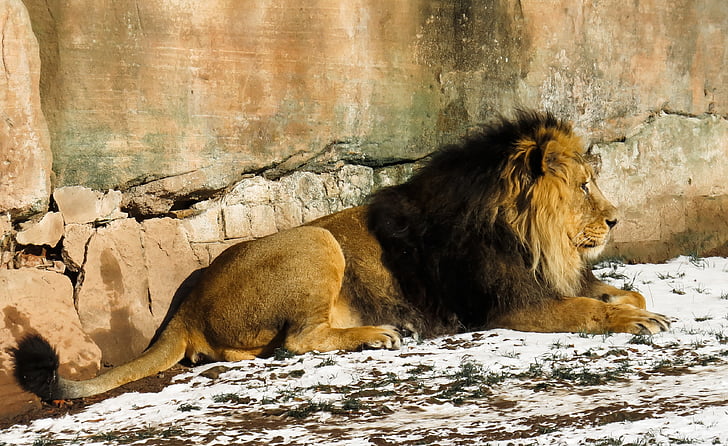The Intriguing World of Black Maned Lions: Separating Myth from Reality

The concept of a black maned lions,, popularized by Disney’s “The Lion King,” particularly the character of Scar, has sparked curiosity and fascination.
This article delves into the reality behind black-maned lions, exploring their characteristics, competitive advantages, and the myths surrounding them.
Understanding Black Manes in Lions:
- The color of a male lion’s mane is a reflection of his health and vitality, with darker manes indicating higher levels of testosterone and overall strength.
- Contrary to a lighter mane, which suggests a weaker lion, a darker mane signifies a more formidable and robust individual.
Competitive Edge of Black Maned Lions:
- In nature, unlike the outcome in “The Lion King,” lions with black manes often have an advantage over their lighter-maned counterparts, for two main reasons:
- Dark manes are associated with strength and good health.
- A black mane can be intimidating in conflicts, giving the lion a psychological edge.
ALSO READ: Meet the East African Lions that Climb Trees
The Attraction Factor:
- Interestingly, female lions show a preference for males with darker manes, attributed to the associated higher testosterone levels.
- While mane size is a factor, the color seems to play a more critical role in attracting mates.
The Heat Challenge for Black Maned Lions:
- Black manes, although advantageous in some aspects, pose a challenge in hotter climates, as they absorb more heat.
- This can affect the lion’s hunting and feeding habits, often leading to nocturnal activities to avoid the daytime heat.
Geographical Variations:
- In cooler regions, like South Africa, male lions can develop larger, darker manes.
- However, rising temperatures and harsh sun conditions might lead to the thinning of lion manes over time.
Development of the Mane:
- Male lions start growing their manes at around two years of age, marking their sexual maturity.
- Interestingly, the development of a mane can lead to their expulsion from the pride to maintain the dominance of the existing male leader.
Mane Color Changes:
- A lion’s mane can change color depending on its health, much like human hair or nails react to health conditions.
ALSO READ: Where does African Lions Live
The Ethiopian Lion:
- The Ethiopian lion, known for its impressive black mane, was once thought extinct but was rediscovered in 2016.
- The Kalahari Desert is also home to lions with notable black manes, standing out against their tawny fur.
The Myth of the Black Lion:
- Despite popular myths, completely black lions do not exist. Images circulating on the internet are often digitally altered.
- In contrast, white lions, which are not albinos but have a rare color mutation, do exist in the wild.
Black Lion Tamarin:
- An interesting twist in the search for black lions is the black lion tamarin, a rare monkey species with a dark mane, found in Brazil.
Melanism in Lions: A Theoretical Possibility:
- While there are no documented cases of all-black lions, the concept of melanism, seen in animals like black panthers and jaguars, suggests that a black lion could theoretically exist.
In conclusion, black-maned lions hold a significant status in the animal kingdom, symbolizing strength, health, and attractiveness. While the idea of an all-black lion remains in the realm
The Intriguing World of Black-Maned Lions: Facts and Fiction
The iconic image of a black-maned lion, popularized by Disney’s “The Lion King,” particularly through the character Scar, has fascinated many. This article aims to demystify black-maned lions, exploring the truth about their appearance, behavior, and the myths that surround them.
ALSO READ: Tiger vs Lion Sizes: The ‘Big Cat Rivalry’
The Significance of a Lion’s Mane:
- A lion’s mane is a key indicator of its health and vitality. Darker manes are generally a sign of greater strength and higher testosterone levels.
- In contrast, a lighter mane often signifies a lion with lesser strength and fighting prowess.
The Advantage of Black Manes:
- Contrary to the portrayal in “The Lion King,” lions with black manes often have a competitive edge over those with lighter manes due to two primary factors:
- A dark mane symbolizes robust health and strength.
- It also serves as an intimidation tool in conflicts, making the lion appear larger and more threatening.
Attraction and Reproduction:
- Female lions tend to prefer males with darker manes, which are linked to higher levels of testosterone.
- While the size of the mane matters, the color plays a more significant role in attracting lionesses.
The Drawback of Dark Manes:
- Despite their advantages, black manes can pose challenges in hot climates due to their heat absorption properties.
- This can impact the lions’ hunting behavior, often leading them to become nocturnal to avoid the daytime heat.
Geographical Influence on Mane Size and Color:
- In cooler areas like South Africa, male lions tend to have larger, darker manes.
- However, increasing temperatures and intense sunlight are thought to be leading to a general thinning of lion manes.
Growth and Social Implications of Manes:
- Male lions start growing their manes at about two years of age, signaling their sexual maturity.
- The emergence of a mane can lead to young males being ousted from the pride to preserve the reigning male’s dominance.
Mane Color Variability:
- A lion’s mane can change color in response to its health, similar to how human hair and nails react to various health conditions.
Dispelling the Myth of Black Lions:
- Completely black lions are a myth, and photos circulating online are often digitally altered.
- Conversely, white lions, which have a rare color mutation, do exist.
ALSO READ: 300 Entertaining and Random Animal Facts
Black Lion Tamarin: A Unique Twist:
- The closest real-life counterpart to the mythical black lion is the black lion tamarin, a rare monkey with a dark mane found in Brazil.
Theoretical Possibility of Melanism in Lions:
- While completely black lions have never been documented, the existence of melanism in other big cats like black panthers and jaguars suggests it could theoretically occur in lions.
In summary, black-maned lions are not just a symbol of strength and health in the animal kingdom but also a subject of intrigue and myth. While the notion of an all-black lion remains a matter of speculation, the real-life black-maned lions continue to captivate our imagination.





